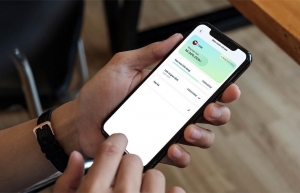BNPL catalyses cashless payments in e-commerce market
VIR hosted the webinar "Buy Now Pay Later - The Future of E-commerce Spending?" to provide a platform for experts and business leaders to exchange ideas and discuss the potential of BNPL services in Vietnam’s e-commerce landscape.
 |
Speaking at the event, Nguyen An Son, head of the Project Development Department at the Centre for Informatics and Digital Technology, the Department of E-commerce and Digital Economy, said that BNPL allows consumers the option to pay for purchases in interest-free instalments over a relatively short period.
BNPL lenders rely on big data to assess the credit scores of customers. The larger the database, the more accurate the credit scores.
He cited a report indicating that that Vietnam's overall online retail sales hit $13.7 billion in 2021. With a CAGR of about 20 per cent, Vietnam’s online retail sales are predicted to rise to $16.4 billion in 2022. The boom in e-commerce opens up a lot of opportunities for BNPL expansion.
“However, the general difficulties of the e-commerce market will also affect the potential of BNPL. In particular, around 73 per cent of online shoppers in Vietnam chose cash on delivery (COD) as their shipping and payment method. 27 per cent of non-cash payments are made by customers who already have a reliable source of income, a bank account, and a credit card. Thus, they are able to cover the cost of the item they wish to purchase rather than opting for a BNPL service. It is challenging for the BNPL service providers to convert 73 per cent of COD usage to BNPL or other cashless payment methods,” he added.
According to Lu Duy Nguyen, senior director at Tiki Corporation, BNPL is quite prevalent in developed countries like Australia, the US, and Europe. Vietnam is a lucrative market for BNPL services given that a small percentage of the Vietnamese population uses credit cards. This trend is also driven by technological advances, big data, and online transactions.
| BNPL products are gaining increasing traction among consumers in Vietnam as both startups and established corporates bet big on them. From local BNPL platforms to big regional players, the deferred payment market is expected to gain widespread adoption in the country. |
“Online payments have gained traction during the pandemic. Among them, BNPL allows customers to split up payments into equal instalments over time. E-commerce platforms will benefit from the rise of BNPL since customers can increase their purchasing power and spending on online products. With the support of BNPL partners, we have pushed marketing and promotion activities to bring more value to customers,” Nguyen noted.
As stated in a report by Research and Markets, the adoption of BNPL payments is expected to grow steadily in Vietnam over the forecast period, recording a CAGR of 45.2 per cent from 2022 to 2028. The BNPL Gross Merchandise Value in the country will increase from $496.4 million in 2021 to reach $10.5 billion by 2028.
To promote BNPL methods, Nguyen Anh Cuong, co-founder and CEO of Fundiin said that it is crucial to identify the persona of online users. New chip-based citizen ID cards have been introduced by the state so that personal data can be collected and coordinated.
This will lay a foundation to develop a platform for financial institutions and fintech startups so they can make better assessments of their customers based on data. Some nations, including Singapore, Indonesia, and India, have made great strides in this area. Hopefully, Vietnam will achieve some progress in the field soon.
 |
There is also no legal framework for new business models like BNPL. The application of the regulatory sandbox will create an environment in which regulators can assess the risks, fees, and benefits of fintech enterprises and promote the progress and development of related tech according to the demands of the market.
Le Van Duong, partner of Indochine Counsel said, “Assuming the transactions are legal, the State Bank of Vietnam (SBV) needs to add more regulations to protect payments between service providers and buyers.”
“BNPL lenders act as the third-party player in e-commerce transactions, which involve customers and e-commerce operators. The SBV needs to request the development of a technology platform to ensure the payment safety of BNPL for buyers, sellers, and service providers. At the same time, SBV or service providers have to assess the credit scores of buyers,” added Duong.
Michal Skalicky, CCO of Home Credit Vietnam said, “Our BNPL product Home PayLater complies with the company's credit rating guidelines. We have also chosen Tiki as our first partner for the BNPL product. The main reason is the trust of customers in this e-commerce platform. We also make it more convenient for our customers so they can shop online quickly. Besides Tiki, we are also looking for other e-commerce partners to further expand our cooperation and promote the popularity of BNPL methods in Vietnam’s e-commerce market.
 | Buy Now Pay Later - The future of retail payment? Foreign and Vietnamese companies are placing large bets on the buy now, pay later approach in Vietnam, thanks to a significant increase in the use of the payment method, but the sector still presents certain dangers. |
 | BNPL products come to aid of consumers The adoption of short-term financing by consumers continues to grow in Vietnam as local and foreign financial companies gear up to meet the soaring demand. |
 | Clearing the way to legal support for BNPL services As of 2022, Vietnam’s population is close to 100 million, with two-thirds being of working age. The country is home to a rapidly growing e-commerce market, yet surprisingly, it is also one of the Southeast Asian countries with the lowest credit card penetrations, estimated at 4.1 per cent in 2021. |
What the stars mean:
★ Poor ★ ★ Promising ★★★ Good ★★★★ Very good ★★★★★ Exceptional
 Tag:
Tag:
Related Contents
Latest News
More News
- VNPAY and NAPAS deepen cooperation on digital payments (February 11, 2026 | 18:21)
- Vietnam financial markets on the rise amid tailwinds (February 11, 2026 | 11:41)
- New tax incentives to benefit startups and SMEs (February 09, 2026 | 17:27)
- VIFC launches aviation finance hub to tap regional market growth (February 06, 2026 | 13:27)
- Vietnam records solid FDI performance in January (February 05, 2026 | 17:11)
- Manufacturing growth remains solid in early 2026 (February 02, 2026 | 15:28)
- EU and Vietnam elevate relations to a comprehensive strategic partnership (January 29, 2026 | 15:22)
- Vietnam to lead trade growth in ASEAN (January 29, 2026 | 15:08)
- Japanese business outlook in Vietnam turns more optimistic (January 28, 2026 | 09:54)
- Foreign leaders extend congratulations to Party General Secretary To Lam (January 25, 2026 | 10:01)






















 Mobile Version
Mobile Version